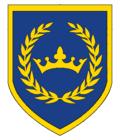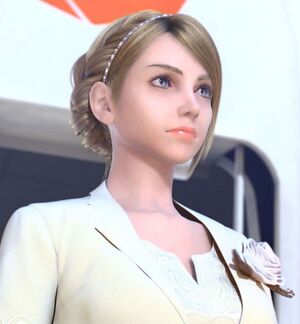Monarchy of Brumen: Difference between revisions
No edit summary |
|||
| Line 47: | Line 47: | ||
=== Reserve Powers of the Crown === | === Reserve Powers of the Crown === | ||
The reserve powers of the Crown is the umbrella term for functions and duties that were not specifically transferred to the chancellor or other government offices and remain under the authority of the monarch. The monarch's reserve powers are divided into two major components: ceremonial & temporal. Ceremonial powers and duties must be acted upon the advice of the [[Chancellor of Brumen|chancellor]], the [[Royal Council]] or [[Parliament of Brumen|parliament]]. However the same cannot be said for a monarch's temporal powers as the constitution explicitly states they are permitted to exercise their temporal powers at their descretion. Therefore it legally permissable for a monarch to exercise their temporal reserve powers without the advice of the government and are only limited by {{wp|Constitutional convention (political custom)|convention}} to not do so unilaterally. | The reserve powers of the Crown is the umbrella term for functions and duties that were not specifically transferred to the chancellor or other government offices and remain under the authority of the monarch. The monarch's reserve powers are divided into two major components: ceremonial & temporal. Ceremonial powers and duties must be acted upon the advice of the [[Chancellor of Brumen|chancellor]], the [[Royal Council]] or [[Parliament of Brumen|parliament]]. However the same cannot be said for a monarch's temporal powers as the constitution explicitly states they are permitted to exercise their temporal powers at their descretion. Therefore it legally permissable for a monarch to exercise their temporal reserve powers without the advice of the government and are only limited by {{wp|Constitutional convention (political custom)|convention}} to not do so unilaterally. | ||
* '''Ceremonial:''' Article XX of Brumen's constitution defines ceremonial powers and functions are duties that the monarch may and must only perform upon the advice of the chancellor, parliament or royal council. It does not give the monarch the ability to decline | * '''Ceremonial:''' Article XX of Brumen's constitution defines ceremonial powers and functions are duties that the monarch may and must only perform upon the advice of the chancellor, parliament or royal council. It does not give the monarch the ability to decline or defer said duties. A loophole exists whereby the constitution does not explicitly forbade delays in exercising ceremonial powers which has been used XX times by monarchs to signal their dissatisfaction with certain tasks. These duties generally involve appointments and ratification of international treaties. | ||
** Appointment of the chancellor. | ** Appointment of the chancellor. | ||
** Appointment of the Royal Council. | ** Appointment of the Royal Council. | ||
| Line 54: | Line 54: | ||
** Ratify international treaties. | ** Ratify international treaties. | ||
* '''Temporal:''' Article XX outlines certain duties and powers that the monarch may execute at their discretion without requiring the express consent or permission from neither the chancellor or parliament, although to date, no monarch has exercised these powers without the express permission of the former and latter office & institution. These powers are referred to as the monarch's temporal powers. | * '''Temporal:''' Article XX outlines certain duties and powers that the monarch may execute at their discretion without requiring the express consent or permission from neither the chancellor or parliament, although to date, no monarch has exercised these powers without the express permission of the former and latter office & institution. These powers are referred to as the monarch's temporal powers. | ||
** Provide royal assent to | ** Provide royal assent to legislation passed by parliament. | ||
** Dismiss the chancellor and members of the Royal Council. | ** Dismiss the chancellor and members of the Royal Council. | ||
** | ** Grant pardons and declare {{Wp|nolle prosequi}}. | ||
** Granting & withdrawal of Brumenese passports. | |||
** Dissolve both houses of the Reichskammern. | |||
** Declare a war of defense | ** Declare a war of defense | ||
Latest revision as of 09:36, 28 November 2024
This article is incomplete because it is pending further input from participants, or it is a work-in-progress by one author. Please comment on this article's talk page to share your input, comments and questions. Note: To contribute to this article, you may need to seek help from the author(s) of this page. |
| Queen of Brumen | |
|---|---|
| Königin von Brumen (Brumenese) | |
 Royal Coat of Arms | |
| Incumbent | |
 | |
| Anne-Marie I since 15 April 2020 | |
| Details | |
| Style | Her Majesty |
| Heir presumptive | XXX |
| Formation | 10 June 1305 |
| Residence | Reichspalast (Official) Althaven Palace (Official) Handelstadt House (Private) |
| Appointer | Hereditary |
The monarchy of Brumen, commonly and constitutionally referred to as The Crown (Brumenese: Die Krone), is the constitutional institution by which a hereditary monarch reigns as the ceremonial head of state of the Kingdom of Brumen. It is the highest office in the Kingdom and is vested with certain executive powers which are collectively referred to as the reserve powers of the crown. In practice the monarch is bound by convention to exercise their reserve powers upon the advice of the chancellor, though there is no constitutional basis for the monarch to do so. While the constitution establishes the monarch commander-in-chief of Brumen's Armed Forces, in practice it is the chancellor that directs the armed forces on behalf of the monarch through royal assent. All soldiers of the Grand Army of the Realm swear allegiance to the monarch and the government of Brumen is officially called Her Majesty's Government.
In spite of its status as a ceremonial head of state, the monarch may at times exercise considerable powers through subtle means. For example, while the constitution of Brumen outlines that the monarch should provide royal assent bills or legislation approved by parliament, it does not specify when the monarch must do so. There has been times when the monarch has purposefully delayed providing their royal assent to controversial bills and pieces of legislation, prompting the chancellor and parliament to rework the bill. The current Monarch is Anne-Marie I who ascended to the throne when her father, Sebastian VII, abdicated on 15 April 2020.
History
Constitutional Role
Article I of the constitution of Brumen establishes the monarch as the living symbol and sovereignty of the Kingdom, the use of the monarch's profile in the country's currency (the Bon), is the clearest interpretation of the aforementioned article. Monarchs are expected to become the guarantors of the constitution, this vests them with certain reserve powers to allow them to carry out this task. Historically monarchs of Brumen have ruled as an absolute monarch where all executive and legislative power are concentrated within the monarch. Since its establishment the powers of the monarch have been drastically reduced to its modern form as a ceremonial head of state, fulfilling mostly non-partisan appointment functions. However in spite of these changes, the monarch continues to wield significant reserve powers though none has been explicitly exercised since the end of the Second Insurrection.
Reserve Powers of the Crown
The reserve powers of the Crown is the umbrella term for functions and duties that were not specifically transferred to the chancellor or other government offices and remain under the authority of the monarch. The monarch's reserve powers are divided into two major components: ceremonial & temporal. Ceremonial powers and duties must be acted upon the advice of the chancellor, the Royal Council or parliament. However the same cannot be said for a monarch's temporal powers as the constitution explicitly states they are permitted to exercise their temporal powers at their descretion. Therefore it legally permissable for a monarch to exercise their temporal reserve powers without the advice of the government and are only limited by convention to not do so unilaterally.
- Ceremonial: Article XX of Brumen's constitution defines ceremonial powers and functions are duties that the monarch may and must only perform upon the advice of the chancellor, parliament or royal council. It does not give the monarch the ability to decline or defer said duties. A loophole exists whereby the constitution does not explicitly forbade delays in exercising ceremonial powers which has been used XX times by monarchs to signal their dissatisfaction with certain tasks. These duties generally involve appointments and ratification of international treaties.
- Appointment of the chancellor.
- Appointment of the Royal Council.
- Appointment of ambassadors.
- Receive foreign emissaries and diplomats.
- Ratify international treaties.
- Temporal: Article XX outlines certain duties and powers that the monarch may execute at their discretion without requiring the express consent or permission from neither the chancellor or parliament, although to date, no monarch has exercised these powers without the express permission of the former and latter office & institution. These powers are referred to as the monarch's temporal powers.
- Provide royal assent to legislation passed by parliament.
- Dismiss the chancellor and members of the Royal Council.
- Grant pardons and declare nolle prosequi.
- Granting & withdrawal of Brumenese passports.
- Dissolve both houses of the Reichskammern.
- Declare a war of defense